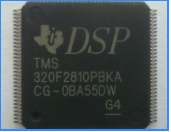TMS320F281x, TMS320C281x DSPs

1.1 Features
1234
• High-Performance Static CMOS Technology • Clock and System Control
– 150 MHz (6.67-ns Cycle Time) – Dynamic PLL Ratio Changes Supported
– Low-Power (1.8-V Core at 135 MHz, – On-Chip Oscillator
1.9-V Core at 150 MHz, 3.3-V I/O) Design – Watchdog Timer Module
• JTAG Boundary Scan Support (1) • Three External Interrupts
• High-Performance 32-Bit CPU ( TMS320C28x™) • Peripheral Interrupt Expansion (PIE) Block That
– 16 x 16 and 32 x 32 MAC Operations Supports 45 Peripheral Interrupts
– 16 x 16 Dual MAC • Three 32-Bit CPU-Timers
– Harvard Bus Architecture • 128-Bit Security Key/Lock
– Atomic Operations – Protects Flash/ROM/OTP and L0/L1 SARAM
– Fast Interrupt Response and Processing – Prevents Firmware Reverse-Engineering
– Unified Memory Programming Model • Motor Control Peripherals
– 4M Linear Program/Data Address Reach – Two Event Managers (EVA, EVB)
– Code-Efficient (in C/C++ and Assembly) – Compatible to 240xA Devices
– TMS320F24x/LF240x Processor Source Code • Serial Port Peripherals
Compatible – Serial Peripheral Interface (SPI)
• On-Chip Memory – Two Serial Communications Interfaces
– Flash Devices: Up to 128K x 16 Flash (SCIs), Standard UART
(Four 8K x 16 and Six 16K x 16 Sectors) – Enhanced Controller Area Network (eCAN)
– ROM Devices: Up to 128K x 16 ROM – Multichannel Buffered Serial Port (McBSP)
– 1K x 16 OTP ROM • 12-Bit ADC, 16 Channels
– L0 and L1: 2 Blocks of 4K x 16 Each Single- – 2 x 8 Channel Input Multiplexer
Access RAM (SARAM) – Two Sample-and-Hold
– H0: 1 Block of 8K x 16 SARAM – Single/Simultaneous Conversions
– M0 and M1: 2 Blocks of 1K x 16 Each – Fast Conversion Rate: 80 ns/12.5 MSPS
SARAM • Up to 56 General-Purpose I/O (GPIO) Pins
• Boot ROM (4K x 16) • Advanced Emulation Features
– With Software Boot Modes – Analysis and Breakpoint Functions
– Standard Math Tables – Real-Time Debug via Hardware
• External Interface (2812) • Development Tools Include
– Over 1M x 16 Total Memory – ANSI C/C++ Compiler/Assembler/Linker
– Programmable Wait States – Code Composer Studio™ IDE
– Programmable Read/Write Strobe Timing – DSP/BIOS™
– Three Individual Chip Selects – JTAG Scan Controllers(1)
• Endianness: Little Endian • Low-Power Modes and Power Savings
– IDLE, STANDBY, HALT Modes Supported
– Disable Individual Peripheral Clocks











